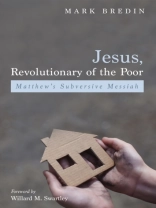Is Jesus relevant to the sufferings of the helpless, the voiceless, those dying of hunger, those traumatized by violence, people with learning difficulties? In Matthew, we see Jesus to be a man on the frontline, battling against the forces that stop the non-poor from living generously, and the poorest of the poor living abundantly the way God intended. This is Jesus as one who in his very being is an expression of God’s wrath against human beings who live their lives as if creation is a battle zone where only the selfish and powerful flourish. Matthew’s Jesus is outraged at the lethargy and apathy that permits non-poor people to live according to practices that lead so many to be excluded from the fruits of God’s creation. But the Jesus found in this gospel is also one who teaches that God has created a world that is good to see; it is abundant as long as people live according to the dynamic order God has inwardly established in creation, one rooted in generosity, hospitality, love, self-sacrifice, righteousness, justice, Torah, and mercy.
关于作者
Willard Swartley is dean and professor of New Testament at the Associated Mennonite Biblical Seminary, Elkhart, Indiana. He has been a Bible teacher in congregational settings and church-wide conferences, in both North America and overseas. His special interests are in the Gospels, the peace teaching of the Bible, and biblical interpretation. He is a graduate of Eastern Mennonite College (BA), Goshen Biblical Seminary (BD), and Princeton Theological Seminary (1973 Ph D).Swartley is the New Testament editor for the Believers Church Bible Commentery Series and New Testament editor for a book series on Studies in Peace and Scripture. Swartley earlier taught at Eastern Mennonite University and served as interim dean there also. He directed the AMBS Institute of Mennonite Studies from 1979-88. He also taught at Goshen College, Eastern Mennonite College and Seminary, and at Conrad Grebel College.Among Swartley’s publications are Mark: The Way for All Nations (Herald Press, 1979, rev. 1981); Slavery, Sabbath, War and Women: Case Issues in Biblical Interpretation (Herald Press, 1983); editor of Essays on Biblical Interpretation: Anabaptist Mennonite Perspectives (IMS, 1984); Israel’s Scripture Traditions and the Synoptic Gospels: Story Shaping Story (Hendrickson, 1994); and co-editor, with Donald Kraybill, of Building Communities of Compassion (Herald Press, 1988).












